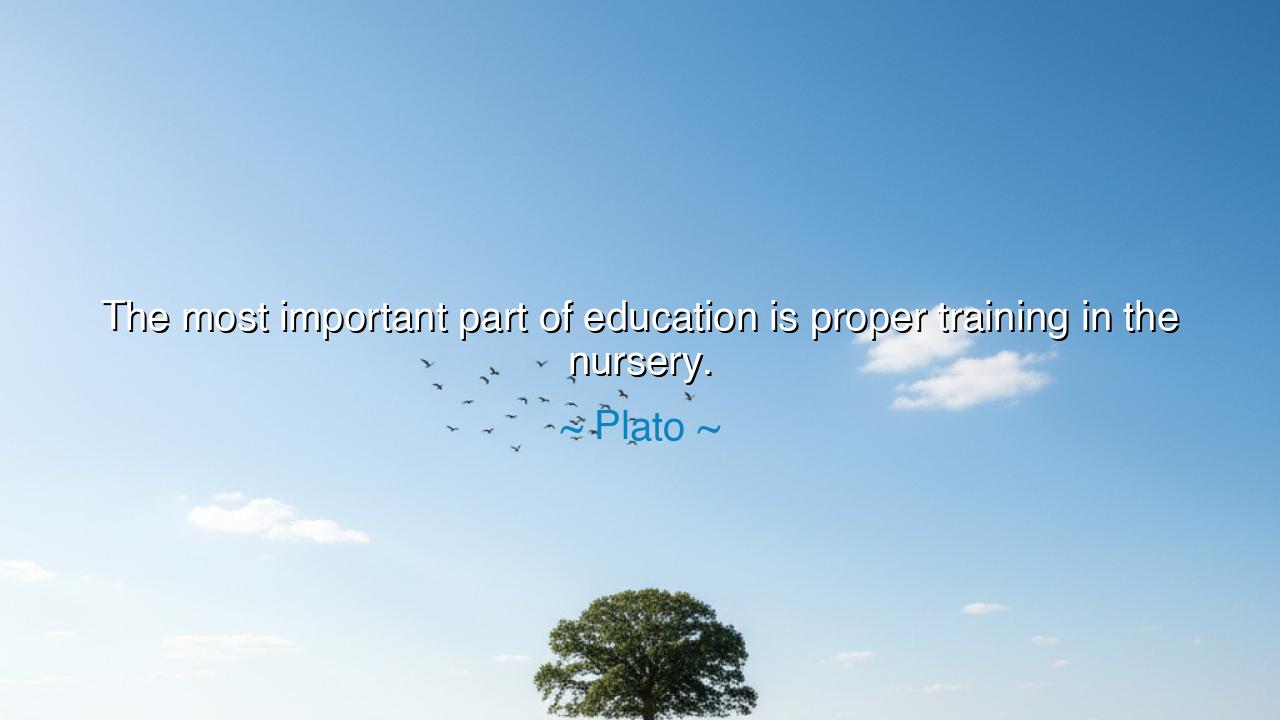
The most important part of education is proper training in the






Plato, the ancient master of wisdom, once declared: “The most important part of education is proper training in the nursery.” In this brief yet powerful saying, he strikes at the heart of human destiny. For what is the nursery but the first garden in which the soul is planted? And what is education if not the shaping of character, the molding of spirit, the awakening of reason? Plato knew that the earliest years of a child’s life are not to be taken lightly, for in them the foundation of all future greatness—or all future ruin—is laid.
The nursery is no small place. It is not merely a room for play or sleep, but the sacred chamber where the child first learns the rhythm of love, discipline, and truth. Just as a young tree bends with the gentlest wind, so too the soul of a child is moved by the smallest lessons, the tenderest habits, the quietest examples. If these early influences are noble, the soul grows upright and strong. But if they are careless, harsh, or corrupt, then the child’s spirit, like a tree twisted in its youth, may bear crooked fruit forever. Plato saw this with clear vision, and his words ring through the ages as warning and command.
History bears witness to this truth. Consider Alexander the Great, who was guided in youth by the teachings of Aristotle. Though Alexander was destined to wield the sword, it was his early lessons in philosophy, science, and ethics that shaped him into more than a mere conqueror. He carried the seed of culture into every land he subdued, spreading Greek thought across the known world. His empire would crumble, but the ideas planted in his nursery of learning would endure for centuries, shaping civilizations long after his armies were dust.
Think also of Frederick Douglass, born into slavery, denied schooling, yet awakened in his childhood by the sound of letters, the whisper of forbidden books. Though his nursery was one of chains and hardship, the early flame of learning lit in him grew into a roaring fire. He would become one of the greatest voices for freedom in history. His life proves Plato’s wisdom: what is sown in the nursery, whether in privilege or in pain, has the power to guide the course of a lifetime.
The meaning of Plato’s words is thus twofold: they are both a call to parents and teachers, and a reminder to society itself. To parents, he says: shape your children with patience, love, and discipline, for you are laying stones that will endure when you are gone. To society, he cries: if you wish for justice, for wisdom, for greatness, do not neglect the schools, nor the homes, nor the nurseries where tomorrow’s leaders are now being formed. The fate of nations rests not in the strength of their armies, but in the strength of their children’s education.
The lesson for us is clear and urgent. Education begins not in universities, but in cradles. The greatest gift you can give a child is not wealth nor inheritance, but right training, good habits, and noble examples. Speak truth in their hearing, show kindness in their presence, nurture discipline in their actions. What you plant in them early will blossom into the values and choices they carry into adulthood. Neglect this duty, and the cost will echo across generations.
Practical steps are within reach. Read to your children, for words shape imagination. Teach them gratitude, for it guards against pride. Discipline them with fairness, for it teaches justice. Let them see you pursue wisdom, for they will imitate what you embody more than what you command. And for those without children, remember: every word spoken, every act of kindness given to the young, is a seed sown in the nursery of the future.
So let Plato’s ancient wisdom resound across the ages: “The most important part of education is proper training in the nursery.” Take this truth into your heart. Guard the children, shape them wisely, plant in them the seeds of virtue, and you will not only shape their lives—you will shape the destiny of the world.






AAdministratorAdministrator
Welcome, honored guests. Please leave a comment, we will respond soon